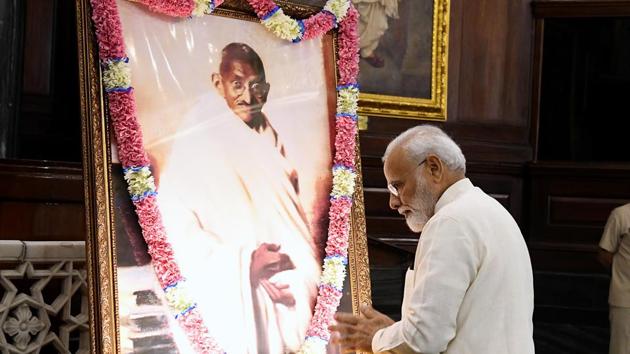‘Rural India open-defecation free’: PM Modi declares on Gandhi Jayanti
Speaking at an event on the Sabarmati riverfront in the heart of Ahmedabad, Modi also announced a pledge to stop the use of single-use plastic, considered harmful to the environment, by 2022.
Prime Minister Narendra Modi declared rural India open-defecation free (ODF) on the 150th birth anniversary of Mahatma Gandhi on Wednesday, meeting the deadline he had set for the flagship government scheme when he first swept to power in 2014.

Speaking at an event on the Sabarmati riverfront in the heart of Ahmedabad, Modi also announced a pledge to stop the use of single-use plastic, considered harmful to the environment, by 2022.
‘Rural India and villages today have declared itself open-defecation free. I especially thank all the volunteers, sarpanchs (village chiefs) and all the others involved with the mission,” Modi told a gathering of 20,000 village chiefs.
The PM made the declaration by pressing the button of a remote, unveiling the map of India as ODF. Simultaneously, the website of the Swachh Bharat Mission- Gramin, which caters to rural India, reported toilet cover to be 100%. The coverage was from 38.7% on October 2, 2014, showed government data. Modi had taken a pledge to stamp out open defecation practices, considered harmful for hygiene and health.
“The world is amazed at our success. In 60 months, we have covered population of 60 crore and constructed more than 11 crore toilets. The world is surprised,” the Prime Minister added. At the event, Modi visited a high-tech exhibition and awarded student winners for essays on cleanliness.
“Gandhiji had given call for freedom and the nation had responded. Five years back, I had given the call for swachhta mission and you all have joined. All that we had was Bapu’s message and confidence in ourselves,” added Modi.
Government data showed 699 districts have been declared ODF. The data added that 100,748,884 toilets had been built across 599,963 villages – all declared ODF. The problem of open defecation is overwhelmingly seen in rural India. Three of the top seven causes of disease and death in India – malnutrition, dietary risks, and poor WASH (water, sanitation, and hygiene) practices -- are directly linked to poor sanitation services and poor hygiene practices.
The Congress hit out at the Centre after the announcement. “It will be a milestone when it’s truly achieved. Some progress has been made in this direction, however this government is prone to making premature claims and tom-tomming false achievements. The recent killing of two dalit children for purportedly defecating in the open belies all such supposed achievements,” said Congress spokesperson Pranav Jha.
“The BJP government’s process to classify a town or a village is a lie. When villages do not have drinking water, how will there be water for toilets? Toilets can be built without water but they cannot be run,” Samajwadi Party chief Akhilesh Yadav too wrote on Twitter.
Despite the huge strides made by the campaign, many experts have expressed scepticism about the eradication of open defecation. Nearly 23% people provided with toilets under the Swachh Bharat mission still preferred to defecate in the open, according to the paper “Changes in Open Defecation in Rural North India: 2014 – 2018”, a survey-based assessment by a team of demographers led by Dianne Coffey, a visiting researcher at the Indian Statistical Institute. Open defecation is still common in Bihar, MP, Rajasthan and UP, it said.
“A number of prior studies have shown that ideas of ritual purity and pollution related to untouchability and the caste system cause many to fear the latrine pit filling up and needing emptying…(this) is a chief reason why open defecation remains so common in rural India, despite latrine ownership,” said Sangita Vyas, one of the co-authors. The team has been monitoring the flagship sanitation scheme’s progress since its start in 2014. According to guidelines, the two main criteria for a village or a gram panchayat to be declared as ODF are 100% access to toilets at the household level and no visible faeces at the village or GP level. The GP also certifies a block or a village as ODF compliant.
Modi called Wednesday’s announcement as only the first step. “For me, satisfaction is when I see girls going to the school without any tension and women no longer require it to get dark to attend the nature’s call,” he added. The next step in the scheme is termed ODF Plus, which refers to a national mission for segregation and recycling of solid and liquid waste management to be implemented through municipalities and gram panchayats. It also includes organic wastes, plastics and household-generated effluents. The PM said that mission had a positive effect on the economy and generated 7.5 million jobs. He said sanitation, conservation of environment and animals were dear to Gandhiji. “Plastic is a major threat to all of them, so we have to achieve the goal to eradicate ‘single-use plastic’ from the country by 2022.”
Modi also visited Sabarmati Ashram. “ I feel lucky that on this occasion when India has successfully stopped open defecation I’m here at the ashram,” he wrote in the visitor’s book.






